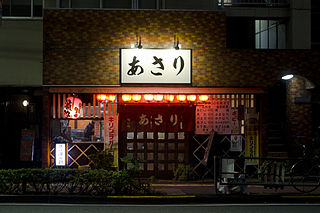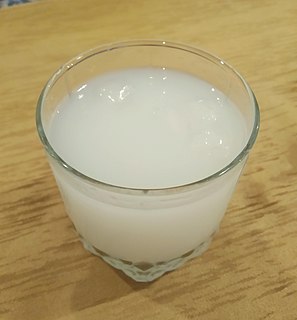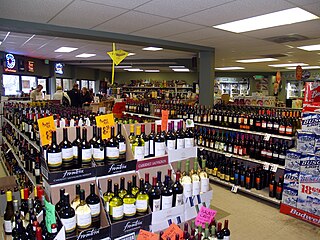
An alcopop is any of certain flavored alcoholic beverages with relatively low alcohol content, including:
- Malt beverages to which various fruit juices or other flavorings have been added
- Wine coolers: beverages containing wine to which ingredients such as fruit juice or other flavorings have been added
- Mixed drinks containing distilled alcohol and sweet liquids such as fruit juices or other flavourings

Drinking games are games which involve the consumption of alcoholic beverages. Evidence of the existence of drinking games dates back to antiquity. Drinking games have been banned at some institutions, particularly colleges and universities.

Low-alcohol beer is beer with little or no alcohol content and aims to reproduce the taste of beer while eliminating the inebriating effects of standard alcoholic brews. Most low-alcohol beers are lagers, but there are some low-alcohol ales. Low-alcohol beer is also known as light beer, non-alcoholic beer, small beer, small ale, or near-beer.

Tequila is a distilled beverage made from the blue agave plant, primarily in the area surrounding the city of Tequila 65 km (40 mi) northwest of Guadalajara, and in the Jaliscan Highlands of the central western Mexican state of Jalisco.

There is a long history of alcoholic drinks in China. They include rice and grape wine, beer, and various liquors including baijiu, the most-consumed distilled spirit in the world.

A bar, also known as a saloon, a tavern or tippling house, or sometimes as a pub or club, is a retail business establishment that serves alcoholic beverages, such as beer, wine, liquor, cocktails, and other beverages such as mineral water and soft drinks. Bars often also sell snack foods, such as crisps or peanuts, for consumption on their premises. Some types of bars, such as pubs, may also serve food from a restaurant menu. The term "bar" refers to the countertop where drinks are prepared and served, and by extension to the overall premises.

Beer pong, also known as Beirut, is a drinking game in which players throw a ping pong ball across a table with the intent of landing the ball in a cup of beer on the other end. The game typically consists of opposing teams of two or more players per side with 6 or 10 cups set up in a triangle formation on each side. Each team then takes turns attempting to throw ping pong balls into the opponent's cups. If a ball lands in a cup, the contents of that cup are consumed by the other team and the cup is removed from the table. The first team to eliminate all of the opponent's cups is the winner.

An izakaya is a type of informal Japanese bar that serves alcoholic drinks and snacks. Izakaya are casual places for after-work drinking, similar to a British or Irish pub, Spanish tapas bar, and American saloon and tavern.

Arak or araq is a distilled Levantine spirit of the anise drinks family. It is translucent and unsweetened.

Malt liquor, in North America, is beer with high alcohol content. Legally, it often includes any alcoholic beverage with 5% or more alcohol by volume made with malted barley. In common usage, it refers to beers containing a high alcohol content, generally above 6%, which are made with ingredients and processes resembling those for American-style lagers.

Baijiu, also known as shaojiu (烧酒/燒酒), is a Chinese colourless liquor typically coming in between 35% and 60% alcohol by volume (ABV). Each type of baijiu uses a distinct type of qū for fermentation unique to the distillery for the distinct and characteristic flavour profile.

A liquor store is a retail shop that predominantly sells prepackaged liquors – typically in bottles – usually intended to be consumed off the store's premises. Depending on region and local idiom, they may also be called an off-licence, bottle shop / bottle-o liquor store (US) or other similar terms. Very limited number of jurisdictions have an alcohol monopoly. In US states that are alcoholic beverage control (ABC) states, the term ABC store may be used.

Flavored fortified wines are inexpensive fortified wines that typically have an alcohol content between 13% and 20% alcohol by volume (ABV). They are made from various fruits with added sugar, artificial flavor and artificial color.

Buffalo or Buffalo Club is a drinking game where participants agree to only drink from their glass with their non-dominant hand. If they are caught using the other hand, they must 'chug' or 'skull' their drink. The game of Buffalo is commonly understood to continue for the players' entire lives, once they have agreed to play.

The Alberta Gaming, Liquor and Cannabis Commission (AGLC) is an agency of the government of the Canadian province of Alberta, and regulates alcoholic beverages, recreational cannabis, and gaming-related activities. References to cannabis were added to AGLC's name and governing legislation as cannabis in Canada moved towards legalization in 2018. AGLC was created in 1996 as the Alberta Gaming and Liquor Commission by combining the responsibilities and operations of the Alberta Liquor Control Board (ALCB), Alberta Lotteries, the Alberta Gaming Commission, Alberta Lotteries and Gaming and the Gaming Control Branch. The current acting Chief Executive Officer as of 2020 is Kandice Machado.
A liquor license is a governmentally issued permit to sell, manufacture, store, or otherwise use alcoholic beverages.

Social customs and laws concerning drinking alcohol in public vary significantly around the world. "Public" in this context refers to outdoor spaces such as roads, walkways or parks, or in a moving vehicle. Drinking in bars, restaurants, stadiums, and other such establishments, for example, is not generally considered to be "in public" even though those establishments are open to the general public. In some countries, such as United States, Norway, Poland, India and Sri Lanka, as well as in larger regions, such as the Middle East, public drinking is almost universally condemned or outlawed, while in other countries, such as Portugal, Spain, Germany, the United Kingdom, New Zealand, Japan and China, public drinking and public intoxication is socially acceptable, although may not be entirely legal.
Binge drinking is the practice of drinking approximately five drinks over a short period of time. Definitions of binge drinking differ in small ways across cultures and across population subgroups. For example, many studies use gender-specific measures of binge drinking. The epidemiology of binge drinking likewise differs across cultures and population subgroups.
South Korea's drinking culture reveals much about its social structure, lifestyle, and traditions. The beverages themselves are also reflective of the country's geography, climate, and cultures.
The Philippines has its own unique drinking culture and practices that are based on influences from its Austronesian heritage to the colonial influences of Spain, the United States, and Japan.

















